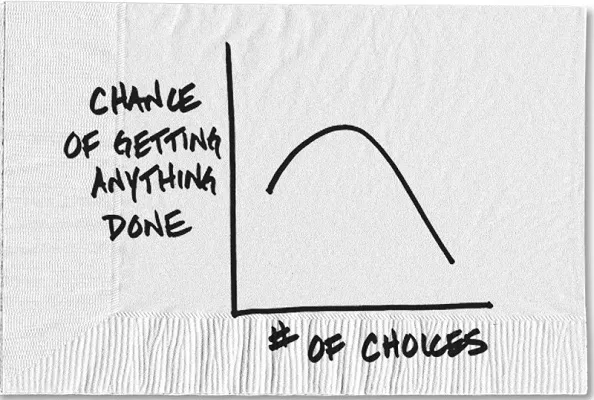Freedom at its essence is the freedom to choose. Humans have been fighting for this for ages, and rightly so. It is indeed an important freedom. But, there are also negative implications of having too many options to choose from. Choices have made your life so difficult. This was the point of discussion in 2005 TED talk by Barry Schwartz, an American psychologist.

We all know the positive side of having options, but here's why too many options are not good:
Paralysis rather than liberation
If you have too many choices, you get confused and often end up taking no decision for a long time. To understand this, you need to understand the procedure you follow for decision. Do this: Think of a colour. Done? Great. Now, what your mind subconsciously did was that it scrolled through at least dozens of colours, and eliminated the ones you did not want until only one was left. Now, if instead of a dozen choices you have millions of them. You would have to make billions of comparisons to arrive at a decision. Too much to contemplate? Same goes for your brain. Choices are good, they offer you variations and save you from monotony. But too much choices can be frustrating, and you decide to do this task tomorrow. And, obviously, tomorrow never comes. Answer this: If you had to choose only one pasta to eat for your entire life, what would it be: Red, White or Pesto? Think wisely, because you don’t want to regret this decision later. You see how difficult this task is, with only three options. If you choose one, you might sometime in your life want to switch your choice.
Opportunity costs
When you have a lot of options, every option is very similar to the other. So, when you do make a choice, you will always be attracted by few things which you could have gotten had you taken a different decision. Hence, you will be less satisfied by your decision. When you decide to do one thing, you are also simultaneously deciding to not do other things. For example, it is a Friday night and you have been invited for a party by two extremely beautiful women but, you guessed it right, you have to choose one of these two. No matter what you choose, you will wonder what would have happened at the other party. This is what opportunity cost is, it subtracts from your satisfaction of your decision, even if your decision is a good one.
Escalation of expectation
Imagine you go to a store to buy shoes. You walk in, ask for shoes for your size, and you are flooded with options. There was a time when you did not have so many choices. And because of these choices, your expectations of how good a pair of shoes can be, went up. So, when you leave the store after what seems like an eternity, you have got the best-fitting shoes ever. All the options you had helped you buy a better shoe, but it made you feel worse. The expectations had created an impression of the “perfect” shoes in your mind. So you compare what you bought with what you had expected, and hence you are disappointed. Adding options can’t help but increase the expectations people have about how good the options can be, which will eventually lead to less satisfaction of results even if they are good results. The truth is, as Schwartz puts it:
Everything was better back when everything was worse.
What if, instead, you bought a bad-fitting pair of shoes? Who will you blame? Back when there were no choices, you would have blamed the world or your destiny. But now that you have so many choices, you are the only person to be blamed for the bad choices.

As an analogy, think of yourselves as tiny fish in a water tank. The tank here symbolises the limitation of choices we have. Had there been no tank at all, and infinite power of choices, it would lead to increase in paralysis and decrease in satisfaction. So there needs to be a tank, the size of which is debatable but not its existence.
You can watch the TED talk here.







